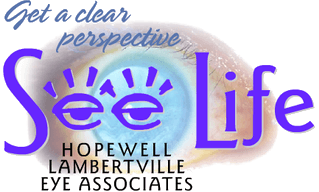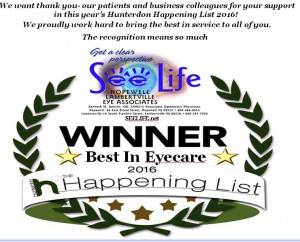Nutrition - AREDS: Help You Keep Your Vision
People whom have concerns about their eye heath or suffer this vision impairment should learn about the proven benefits of the formulations produced by the AREDS and AREDS2 to reduce the risk of AMD (Aged Related Macular Degeneration), cataracts, or glaucoma. Whether you have you have a family history of macular degeneration or retinal concerns or cataracts, developing drusen or early AMD intermediate or advanced AMD, or you are simply curious about your chances, it is important to stay informed. Make an appointment to visit Hopewell - Lambertville Eye (www.seelife.net) to learn more about these supplements and speak to our doctors about the best option(s) for you.
Most eye problems stem from vision-impairment caused by genetics and ageing which cannot be aided by boosting your levels of beta-carotene from carrots, which the body converts to Vitamin A (retinol).
Vitamin A is essential for the promotion of general growth, the maintenance of visual function, the regulation of tissues and embryonic development. Vitamin A deficiency can cause visual malfunctions such as night blindness as it helps the eye convert light into a signal that can be transmitted to the brain, allowing people to see under conditions of low light.
Most us get enough of the vitamin through preformed Vitamin A – high concentrations of which are found in liver and fish oils. Other sources of preformed vitamin A are milk and (organic) eggs, which also include some provitamin A.
Most dietary provitamin A comes from leafy green vegetables, orange and yellow vegetables, tomato products, fruits, and some vegetable oils.
So, while carrots have the reputation as an eye superfood, beta-carotene is found in much higher concentrations in leafy greens such as spinach.
Truth be told, if Bugs Bunny and Popeye had a fight to prove greater visual acuity, Popeye would trounce Bugs only because of a higher concentration of green leafy vegetables in Popeye's diet.
A small kale salad has 70,829 IU of retinol and 3.5 milligrams of beta-carotene, whereas a half-cup of raw carrots, has 10,692 (IU) of retinol and 0.534 milligrams of beta-carotene.
Nuts and seeds can reduce risk of macular degeneration progression
While carrots will not prevent or slow the progression of eye disease, nuts and seeds can claim superfood status when it comes to eye health.
Recent studies relating to Vitamin E, found commonly in nuts and seeds, have been shown to reduce the risk of age related macular degeneration (AMD).
According to American Optometric Association, “Nuts and seeds contain a powerful antioxidant that helps protect cells against the damaging effects of unstable molecules, called free radicals. An imbalance of free radicals leads to oxidative stress, which in turn, increases the risks for age-related macular degeneration and cataract formation.”
An Age-Related Eye Disease Study has established a link between AMD and nutrition. The study showed that a 400 IU/day intake of vitamin E -- in the form of a supplement also containing beta-carotene, vitamin C, zinc and copper -- could reduce the risk of AMD progression by 25 per cent of subjects at high risk for the disease.
The American Optometric Association cited other studies which have found that long-term vitamin E use correlated with greater lens clarity and slower age-related opacification, while vitamin E, paired with higher dietary intakes of lutein and zeaxanthin, significantly decreased the risk of cataracts.
A Breakthrough in B3
As published in Australian Optometry, recent US ‘breakthrough’ research shows that vitamin B3 or nicotinamide can prevent glaucoma and stop progression of existing disease in animals.
The research published in Science has not been tested on humans, so optometrists are not yet advising patients to rush out and buy vitamins until human trials provide more answers.
It’s all about balance and variety
Researchers have linked eye-friendly nutrients, such as lutein and zeaxanthin, vitamin C, vitamin E and zinc, to reducing the risk of certain eye conditions.
Age-related macular degeneration (AMD) is a serious eye condition that millions suffer from every year. It is the irreversible deterioration of the macula, a tiny area of the retina that is responsible for our central or “straight-ahead” vision. The macula allows the eye to discern detail and provides our color vision.
Although AMD does not lead to complete blindness, it does impair daily activities, such as driving, reading, writing, cooking and the ability to see faces. Macular degeneration is fairly widespread, affecting about 11 million people in the U.S. who are 60 years or older. The number of those affected is projected to reach 22 million by 2050.
Specific nutrients have been proven to reduce the progression of AMD. It is important to familiarize yourself with these options because AMD progresses at different speeds for every person.
AREDS
The age-related eye disease study (AREDS) conducted by the National Eye Institute (NEI) is the “only large-scale randomized controlled clinical trial.” It revealed a beneficial effect of nutritional supplementation of 25 percent in reducing the risk of progression in patients diagnosed with intermediate or advanced levels of macular degeneration.
Based on results from advanced AMD and a five-year follow up, the recommended AREDS formulation includes beta-carotene, zinc with copper and vitamins C and E.
AREDS recommends only those with intermediate and advanced AMD to take these supplements, as there is currently insufficient evidence to recommend preventive use of the supplements for healthy adults.
AREDS2
AREDS2, the second study conducted to improve the original AREDS formula, found that lutein and zeaxanthin, when taken together, showed to be a safer and more effective alternative to beta-carotene. The AREDS 2 formula has powerful anti-aging properties for patients.
A common concern among consumers is whether they can continue to take their daily multivitamins. The AREDS formulation actually supplies consumers with much higher doses of vitamins and minerals than can be found in the typical multi-vitamin pill, so there is no need to continue taking one while on the AREDS recommended formulation.
Visit Hopewell - Lambertville Eye (www.seelife.net) to learn more about these supplements and speak to our doctors about the best option for you.




